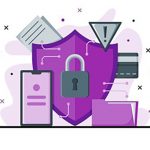
With the snowballing nature of global cyber threats it’s never been more important than now to keep your head in the game – your eye on the ‘ball.’ Threats are intent on destroying computers, stealing data, or taking your money. Understanding what they are and how cybersecurity protections against them work will come in handy.
What are the top 3 cyber security threats?
There are many varied forms of threats. Some are old, some are new, and some are very tricky. The most common, or top 3 tend to stay the same over the last few years.
Phishing
This is consistently the most common form of attack. It’s like the invention of the wheel: irreplaceable. Phishing is never going away – not as long as people communicate electronically. Hackers want to trick you into giving away your personal data or lure you into clicking on a malicious link or attachment. These attacks may involve a phony message or fake websites. Always check the sender’s email address by hovering your cursor over it. Never EVER click on suspicious links.
Ransomware
Ransomware is like the oldest, classic guitar riff from rock and roll – it still works, so they keep playing it. It works by getting you to click on a malicious link or attachment and it immediately locks your system and your files and demands money to unlock them. It can spread through email attachments or unsafe downloads. Keep your software updated and back up your files regularly.
Malware
Malware is a catch-all for everything that’s dangerous in cyber-world. It’s malicious software that can hurt you in a number of ways: it may cause damage to your computer, steal your data and spy on you. Use antivirus software and avoid downloading files from unknown sources.
How do I keep myself safe online?
This gets harder all the time, but online safety is of paramount importance – that’s where the crooks lay in wait. Here are some simple steps to take to protect yourself from cyber threats.
Create Strong Passwords
We can’t preach this enough. The NUMBER ONE most common password in the world is ‘123456.’ It is also the NUMBER ONE easiest to crack (and trying to ‘mix it up’ by using ‘654321’ isn’t fooling anybody). Use strong and unique passwords for each and every account (do NOT Reuse passwords). A strong password includes letters, numbers, and symbols. Change your password regularly. Check out the useful tips in our article ‘Creating Strong Passwords.’
Adopt Two-Factor Authentication (2FA) or Multi-Factor Authentication (MFA)
Two-factor authentication provides an added layer of security. When it is in place, one keys in their password, but then has to take an extra step to log in, commonly by getting a code on your phone. Whenever possible, turn that on. MFA simply adds yet another step, like fingerprints, facial recognition, a retinal scan, or even just a personal question like “What was your first pet’s name?”
BEWARE of Public Wi-Fi!
Free public Wi-Fi, like at an airport or Starbuck, is not secure. It is easy for hackers to hack into the data of people who use public networks. Always connect your VPN (Virtual Personal Network) when using any public Wi-Fi network – it will encrypt your communications.
Why is cyber security important in personal life?
Because crooks are after everyone. Cybersecurity doesn’t only apply to big corporations. It’s like Goldilocks and the Three Bears. Some hackers will find you too big, some will find you too small, but for some, you will be just right. Everyone should be knowledgeable about cyber threats and their prevention techniques.
Protect Your Personally Identifiable Information (PII)
Your PII is worth something to somebody. Cybercriminals can use it for identity theft or fraud. Be cautious about what you share online.
Keep Financial Transactions Secure
We love the convenience of online banking and shopping, but they can be risky activities if not done securely. Use secure websites and monitor your accounts regularly for any suspicious activity.
What steps you should take if you are a victim of a cyber crime?
No matter how many precautions you take, you may still become the victim of a cyber-attack. Knowing your next step is crucial.
File an Incident Report
An immediate report of the cyber-attack should be made to the authorities, or to your IT services team or Managed Services Provider (MSP). This could help reduce your own liability and aid in investigations, reducing any damage to you.
Change Your Passwords
Change all your passwords immediately if you suspect a breach. This prevents further unauthorized access to your accounts.
How are cyber threats evolving?
We are still in the dawning stage of the latest evolution in cyber threats: Artificial Intelligence (AI). AI can make phishing attacks seem much more believable, and many are wary of leaving messages on strangers’ voice mails, because your voice can be repurposed to serve criminal ends. Cyber threats will continually change with emerging technologies. It’s wise to stay up to date on new threats for better protection.
Exploitation of the Internet of Things (IoT)
More and more, hackers are using your smart gadgets as a back door to your network. There are more and more devices connecting via the internet, and they are becoming the main targets of cyber criminals. Make sure that all devices have updated security measures on them.
Frequently Asked Questions
How often do people get hacked?
According to a study at the A. James Clark School of Engineering at the University of Maryland, cyberattacks happen frequently, with estimates ranging from one attack every 39 seconds to someone falling victim every 11 seconds. A significant portion of these attacks involve social engineering techniques like phishing, which can lead to compromised accounts and devices.
How do social engineering attacks happen?
To boil a complex methodology down to its bare essentials, a social engineering attack exploits human psychology and weakness to manipulate victims into divulging sensitive information or taking actions that compromise their security, such as clicking a link or attachment in a phishing email.
Criminals use deception and trust-building techniques to trick individuals into making mistakes, often leveraging fear, urgency, or empathy. These attacks can occur online through emails, websites, and social media, or in person through physical interactions.
How do I know if I have ransomware?
You will know immediately - as fast as if you had severely stubbed your toe (“OUCH!!!”). Make a bad click on malware and your computer locks up, your data is encrypted, and a screen appears demanding a ransom in cybercurrency (like Bitcoin) to decrypt and unlock your system. It usually happens in the blink of an eye, although some newer attacks delay the lockdown long enough to steal your data first.
What are the 4 R's of online safety?
McAfee cites these 4 R’s as the ‘Golden Rule’ for safe online navigation:
Respect: I treat myself and others the way I like to be treated
Responsibility: I am accountable for my actions and I take a stand when I feel something is wrong Reasoning: I question what is real
Resilience: I get back up from tough situations
What does a VPN do?
A Virtual Private Network (VPN) provides a secure conduit for your internet connection, encrypting your data and masking your IP address. This helps to protect your privacy and security by preventing your online activity from being tracked and intercepted.
How secure is your network?
As a reputable member of the IT Support Los Angeles community since 2002, IT Support LA offers a FREE, no-risk network and cybersecurity assessment. It is a non-intrusive scan that allows us to deliver a comprehensive report that is yours to keep. No strings, and no obligation to ever use our Managed IT Services.
The best defenses are expert cybersecurity to protect your data from theft, and a top-notch Managed Services Provider (MSP) to ensure continued reliability and defenses against newly emerging threats.
With our 100% Money Back Guarantee in writing, we offer a risk-free way for prospective clients to try us out. Because we do not require a ‘hard’ contract, our clients can fire us at any time with 30 days’ notice. We have to be good.
Among the Managed IT services we provide:
IT HelpDesk Service
Onsite IT Support
Cybersecurity
Cloud migration and management
Email migration services
Backup and disaster recovery
VoIP phone systems
IT disposition and recycling
Office moves
White label services (IT to IT)
IT Support LA is an award-winning Managed Services Provider (MSP):
o 3 Years awarded Best IT by the Small Business Expo
o Awarded 2nd best company of any type in the US by the Small Business Expo SB100
o Awarded Best IT Support in California by Channel Futures
o Winner of Best IT in Los Angeles by Channel Futures
o Listed as one of the world’s Top 501 MSPs by CRN and in the top 250 in the ‘Pioneer’ listing
o 4 years listed as one of the Top 501 MSPs in the World by Channel Futures
o Listed as #21 MSP in the World in Channel Futures NextGen 101
o Globee 2021 Bronze Award winner for Chief Technology Officer of the Year
o Globee 2022 Gold Award winner for Chief Technology Officer of the Year
o Named one of 2022’s 50 ‘Best’ businesses in California by UpCity
o Named Best of IT winner by UpCity
o Winner of Local Excellence Award for 2021, 2022 and 2023 by UpCity
o Named Best of Cloud Consulting winner by UpCity
o Certified as Top Managed Services Providers and Cybersecurity Pro by UpCity
o Named Best IT in Los Angeles by Expertise.com.
Stay Safe Online: Contact Us for More Tips!
Cyber threats are real and growing every day. In this digital age, it is very important to protect yourself online.
For more tips on staying safe online, contact us today and take advantage of our FREE no-risk network and cybersecurity assessment.
818-805-0909


